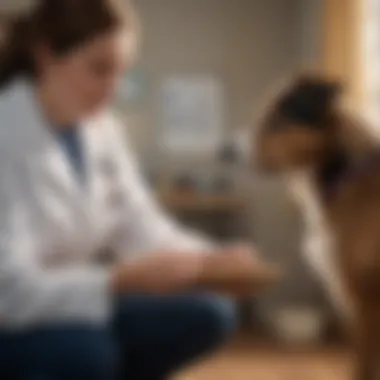Essential Care for Dogs with Diarrhea: Dietary Solutions


Intro
Managing a dog's health is a crucial task for every pet owner. When a dog suffers from diarrhea, it can be stressful for both the pet and the owner. Understanding how to address this condition effectively is vital. Diarrhea can arise from various causes, ranging from minor dietary indiscretion to more severe health issues. Thus, it is essential to know what to provide for your dog during this time to ensure a quick and effective recovery.
Understanding Your Pet
A dog's breed and individual characteristics can influence how they respond to gastrointestinal problems like diarrhea. Moreover, recognizing common temperaments can aid in alleviating stress caused by discomfort. Each breed may have its own predispositions, so it is useful to be aware of these traits.
Breed Traits
Different breeds can experience diarrhea for varied reasons. For instance, some breeds, like the Labrador Retriever, are known for their tendency to eat anything they find, potentially leading to digestive issues. Other breeds may have more sensitive stomachs that react poorly to certain foods. Therefore, understanding breed traits is essential.
Common Temperaments
A dog’s temperament can also play a role in their recovery from diarrhea. Dogs that are more anxious or prone to stress may exhibit worsening symptoms during gastrointestinal distress. In these cases, owners must be patient and supportive.
Special Needs
Certain dogs may have special dietary needs or underlying health conditions. For example, senior dogs or those with chronic health issues might require specific care when experiencing diarrhea. It’s vital for pet owners to consider these aspects in providing proper care.
Pet Care Essentials
Addressing diarrhea involves more than just offering the right foods. A holistic approach to pet care will aid in the dog’s recovery.
Nutrition and Feeding Guidelines
During a bout of diarrhea, dietary modifications can be necessary. It is often recommended to introduce a bland diet. Cooked rice and boiled chicken are typically easy on the stomach. Avoid fatty or spicy foods, as these can exacerbate the problem. Additionally, small, frequent meals can help ease digestion.
Grooming Tips and Techniques
Maintaining proper hygiene is crucial during this period. Diarrhea can lead to messiness, and frequent baths may be necessary to keep your dog clean. Always use gentle products that are pet-friendly.
Health and Wellness
Hydration is vital. Ensuring your dog remains hydrated can prevent further complications. If your dog refuses to drink water, consider offering broth, as it may encourage them to consume more fluids.
Dogs can become dehydrated rapidly. Therefore, monitor their water intake closely.
When to Seek Veterinary Assistance
It is essential to recognize when diarrhea necessitates professional help. If your dog has diarrhea for more than 24 hours or exhibits symptoms such as lethargy, vomiting, or blood in stool, a visit to the veterinarian is prudent.
Ending
Managing a dog with diarrhea demands careful attention to their needs and well-being. Each dog is unique, and their response to treatment will vary. By employing appropriate dietary strategies and monitoring their condition, owners can assist their pets in recovering smoothly. Ultimately, ensuring your dog's comfort and health is the primary goal.
Understanding Diarrhea in Dogs
Diarrhea in dogs is a condition that pet owners often encounter, yet it is frequently misunderstood. Understanding diarrhea helps caregivers make informed decisions regarding their dog's health. A thorough grasp of this subject allows for timely interventions and can prevent the situation from worsening. Each dog is unique, and their responses to gastrointestinal disturbances can vary significantly. Addressing diarrhea promptly is crucial. Left unchecked, it can lead to significant dehydration and possible complications.
Definition of Diarrhea
Diarrhea is characterized by loose or watery stools that occur more frequently than normal. It can manifest as a sudden change in a dog's bowel habits. In most cases, a brief episode of diarrhea might not be alarming and could resolve itself. However, distinguishing between occasional diarrhea and a persistent issue is vital for determining the necessary actions.
Common Causes


There are numerous potential triggers for diarrhea in dogs. Some common causes include:
- Dietary indiscretion: Eating spoiled food, trash, or foreign objects
- Food intolerances: Some dogs may react negatively to certain ingredients in their diet
- Infections: Bacterial or viral pathogens can lead to gastrointestinal upset
- Medications: Some medications can irritate the digestive system
- Stress: Changes in the dog's routine or environment may cause anxiety-induced diarrhea
Understanding these causes can help in pinpointing the reason behind a dog's diarrhea, making it easier to provide appropriate care.
Symptoms to Observe
While diarrhea itself is a primary symptom, other signs may provide insight into your dog's overall condition. Pet owners should keep an eye out for:
- Lethargy: A marked decrease in energy levels
- Vomiting: In some cases, dogs may vomit along with diarrhea
- Loss of appetite: A sudden disinterest in food
- Excessive thirst: Increased water intake as a response to dehydration
- Abdominal pain: Signs of discomfort or a bloated abdomen
Noting these symptoms can help determine if the situation requires veterinary attention, thus ensuring timely care.
Understanding the underlying issues of diarrhea is essential for effective management and care.
Immediate Care for Dogs with Diarrhea
Immediate care is essential for dogs experiencing diarrhea, as it can indicate a variety of health issues, from mild to severe. Quick and appropriate actions can prevent the situation from worsening and lead to a more effective recovery. This section informs pet owners about critical elements to consider when their dog has diarrhea.
Assessing Severity
Before deciding on a course of action, it is important to assess the severity of your dog's condition. Observe the frequency and consistency of the diarrhea. Take note of any accompanying symptoms such as vomiting, lethargy, or blood in the stool.
- Mild Diarrhea: Occasional loose stools that do not result in dehydration. Can often be managed with home care.
- Moderate Diarrhea: More frequent loose stools but combined with some other signs of discomfort or mild vomiting. Requires attention but not always a vet visit.
- Severe Diarrhea: Persistent diarrhea leading to dehydration or presence of blood. This situation necessitates prompt veterinary care.
It is prudent to keep track of your dog's behavior. If your dog seems unusually tired or refuses to drink water, these can be signs of a more serious issue requiring immediate veterinary consultation.
When to Withhold Food
While tempting, offering food immediately after the onset of diarrhea is often not advisable. If you notice loose stools but no other alarming symptoms, consider withholding food for 12 to 24 hours. This allows the dog's gastrointestinal tract to rest and recover. After this fasting period, you can gradually reintroduce bland foods.
However, if your dog exhibits persistent symptoms or has severe diarrhea, withholding food might not be enough. Consult with a veterinarian, as further intervention might be necessary.
Hydration is Key
One of the most critical aspects of immediate care is ensuring your dog stays hydrated. Diarrhea leads to fluid loss, which can quickly result in dehydration. Keep fresh water accessible at all times, and encourage your dog to drink.
You can also offer an electrolyte solution formulated for pets. This helps replenish essential minerals and fluids. Signs of dehydration include dry gums, lethargy, and reduced skin elasticity. If your dog shows these signs, contact a veterinarian without delay.
For every hour your dog experiences diarrhea, they can lose significant amounts of water, making it essential to manage their hydration carefully.
Nutritional Strategies for Recovery
Nutritional strategies play a crucial role in aiding recovery for dogs experiencing diarrhea. Supporting the digestive system through appropriate dietary adjustments can help restore balance and minimize discomfort. It is essential to provide food that is gentle on their stomachs and promotes healing, thus ensuring a quicker return to health. This section will outline how to select the right food, as well as considerations for meal frequency and portion size to maximize benefits for the dog's recovery.
Bland Diet Recommendations
A bland diet is often recommended for dogs suffering from diarrhea. This type of diet serves several purposes, such as allowing the digestive tract to rest while also providing necessary nutrients. Common bland diet options include:
- Plain boiled rice: This is easy to digest and provides carbohydrates to help firm up stool.
- Boiled chicken: Skinless, boneless chicken provides protein without excessive fat, making it a gentler option for sensitive stomachs.
- Pumpkin: Canned pumpkin is a natural source of fiber, which can help regulate the digestive system.
When introducing a bland diet, it is preferable to mix boiled chicken with rice or pumpkin. Serve small, frequent meals to help the dog gradually adjust.
Safe Foods to Introduce
As diarrhea resolves, you can begin to reintroduce certain safe foods back into the dog’s diet. Choose foods that are low in fat and easy to digest. Helpful options include:


- Low-fat cottage cheese: This is rich in protein and calcium, aiding recovery.
- Sweet potatoes: They provide vitamins and minerals, and the fiber can help regulate digestion.
- Bananas: This fruit is gentle on the stomach and can help replenish lost potassium.
Ensure to slowly incorporate these foods to avoid overwhelming the dog’s digestive system.
Foods to Avoid
Not all foods are suitable during recovery from diarrhea. Certain items may exacerbate the condition or irritate the digestive tract. Avoid:
- Fatty foods: High-fat content can be hard to digest and may worsen diarrhea.
- Dairy products: Many dogs are lactose intolerant, leading to further gastrointestinal upset.
- Spicy foods: These can irritate the stomach lining and should be completely ruled out.
It's vital to start with safe options and remain cautious of foods that may lead to complications.
Consider monitoring the dog’s reactions to reintroduced foods to detect any adverse effects quickly. Keeping a detailed record of dietary changes can help guide future decisions in the dog's nutrition and recovery process.
Probiotics and Supplements
When a dog experiences diarrhea, recovery can often be aided by the introduction of probiotics and certain supplements. These are significant components in managing gastrointestinal health and restoring balance in the digestive system. If used carefully, they can speed up the recovery process, allowing your dog to return to its normal routine.
Role of Probiotics
Probiotics are live microorganisms that provide health benefits, primarily linked to gut health. They help maintain a balanced microbiota, which is vital for digestion and overall well-being.
When a dog has diarrhea, the balance of gut bacteria can be disrupted. Probiotics work to restore this balance, often helping to diminish diarrhea duration and severity. They can also enhance the immune response. Some strains to consider include Lactobacillus and Bifidobacterium, which are widely known for their positive effects on canine digestion.
Adding probiotics to a dog’s diet can be done through various methods:
- Probiotic-rich food: Yogurt can be an option, but some dogs are lactose intolerant, so this should be assessed first.
- Probiotic supplements: These come in powder or gel form and often contain specific strains targeted at restoring gut health.
The integration of probiotics must be done with consideration of the dog's overall condition and should ideally be suggested by a veterinarian.
When to Use Supplements
The necessity of supplements may arise not only during diarrhea but also at various stages of a dog’s life. When dealing with diarrhea, certain supplements can significantly support recovery.
- Digestive Enzymes: These can aid in breaking down food more effectively, easing the digestive process. They may be especially beneficial if your dog is also experiencing related symptoms, like bloating.
- Electrolyte Solutions: If diarrhea has led to dehydration, electrolyte solutions can provide crucial hydration and replace lost minerals.
- Glutamine: This amino acid helps in healing the gut lining and can be useful in the recovery phase.
Consult a veterinarian when considering supplements. Each dog is unique, and the right choice can vary based on the individual animal's health status and needs. It is essential to avoid any self-medicating without guidance.
Monitoring and Follow-Up Care
Monitoring a dog that has diarrhea is essential for ensuring their recovery and maintaining overall health. Paying attention to your dog's condition can help you detect any changes that may require further medical attention. Follow-up care not only aids in recovery but also provides peace of mind for pet owners. It is important to keep track of symptoms, diet, hydration, and behavior during this time.
Tracking Recovery
Keeping a close eye on your dog's recovery can help you identify what works and what does not. Some specific elements to observe include:
- Frequency of Bowel Movements: Monitor how often your dog defecates and the consistency of the stool. An improvement in consistency indicates recovery.
- Appetite: Note if your dog shows interest in food. A return to normal eating habits often suggests that their digestive system is stabilizing.
- Energy Levels: Observe your dog’s energy. If they seem more active and playful, it could be a sign of recovery.
- Hydration: Ensure your dog remains hydrated. Look out for symptoms of dehydration, such as dry gums or lethargy.
Each of these factors provides insight into your dog's health. It is wise to document these observations daily, as they can be helpful if you need to consult a veterinarian later.
Recognizing Red Flags
Certain signs indicate that follow-up care is not enough and that professional assistance is necessary. Be alert for:
- Persistent Diarrhea: If diarrhea continues for more than 24 to 48 hours despite home care, consult a vet.
- Vomiting: Occasional vomiting can be normal, but if it becomes frequent, it can lead to dehydration.
- Blood in Stool: Any traces of blood, whether bright red or darker, can indicate a more serious condition.
- Severe Lethargy: If your dog is unusually tired or unresponsive, seek veterinary care immediately.
- Weight Loss: Notable weight loss within a short timeframe is concerning and should be evaluated by a vet.


Recognizing these red flags is crucial. Early intervention is often key to successful treatment and can prevent serious health complications.
By keeping a vigilant watch and understanding what to monitor, dog owners can provide their pets with the best care during a bout of diarrhea. This ensures a quicker recovery and safeguards their overall well-being.
When to Consult a Veterinarian
Consulting a veterinarian is a crucial step when dealing with a dog's diarrhea. Understanding when to seek professional help can make a significant difference in your pet's health outcomes. Not all cases of diarrhea require medical intervention, but recognizing the signs that indicate a serious condition is essential for effective care.
Identifying Serious Conditions
There are specific symptoms that may signify a serious issue. If your dog has diarrhea accompanied by vomiting, lethargy, or loss of appetite, it could be a sign of a more severe underlying condition. You should also be vigilant if you notice blood in the stool or if the diarrhea lasts more than a day or two. These symptoms could indicate infections, parasitic infestations, or even more serious conditions like pancreatitis.
Additionally, consider the dog’s age, breed, and health history. Puppies and senior dogs are at a higher risk for dehydration and other complications, so prompt veterinary consultation is especially important for these pets.
Important Note: Early intervention can often lead to better health outcomes. If in doubt, it is always safer to consult a veterinarian.
Routine Check-Ups
Regular veterinary check-ups play a vital role in maintaining your dog's health. They allow for early detection of issues that may not yet display obvious symptoms, including potential digestive problems that could eventually lead to diarrhea. Routine examinations often include assessments that can reveal underlying health issues, such as organ function or parasitic infections, which may present as gastrointestinal disturbances.
Establishing a relationship with a veterinarian ensures that you have a trusted resource for advice and emergencies. This is particularly important for managing chronic health concerns or allergies that might contribute to digestive problems.
Overall, knowing when to consult a veterinarian and maintaining regular appointments can provide peace of mind and assure proper care for your dog’s health.
Preventative Measures
Preventative measures play a critical role in the overall health and well-being of dogs. By establishing a routine that incorporates key elements, pet owners can minimize the risk of their dogs experiencing diarrhea. These measures not only support a healthy digestive system but also contribute to a dog's general happiness. Implementing these strategies requires attentiveness and can lead to significant benefits in your dog's life.
Maintaining a Balanced Diet
A balanced diet is fundamental. Feeding your dog a diverse array of nutrients helps maintain proper digestion. Ensure that your dog's meals are rich in high-quality proteins, carbohydrates, and fats. A consistent feeding schedule can prevent over-indulgence or under-eating, which may lead to gastrointestinal issues. Always consider your dog's age, size, and activity level when determining a suitable diet plan.
A balanced diet helps in maintaining optimal digestion, supporting overall health in dogs.
As a guideline:
- High-quality commercial dog food is recommended. Look for brands that prioritize real meat and whole foods.
- Fresh fruits and vegetables can be included in moderation. Carrots and blueberries are often good choices.
- Regular checks on food ingredients ensure your dog avoids allergens, which can cause digestive upsets.
Regular Vet Visits
Consistent veterinary check-ups are vital for prevention. Regular visits allow for early diagnosis of any potential health issues. Your vet can provide vaccinations, preventatives, and general advice tailored to your dog's specific needs.
During these visits, keep track of your dog's weight and any changes in behavior. This will help the vet assess health over time. For adult dogs, an annual check-up is usually recommended, while puppies may need more frequent visits based on their vaccination schedule.
Controlling Stress Factors
Stress can significantly impact a dog's gastrointestinal health. Identifying and mitigating stressors in your dog's environment is essential. Common stress factors might include:
- Changes in routine: Dogs thrive on consistency. Sudden changes in daily schedules can lead to anxiety.
- Exposure to loud noises: Fireworks or thunderstorms can induce fear. Comfort and distraction can be helpful during these times.
- New pets or people in the home: Gradual introductions can minimize stress and help your dog adapt.
Ensure that your dog has a comfortable space to retreat to when feeling overwhelmed. Regular exercise can also help alleviate stress by providing an outlet for energy and anxiety.
By focusing on these preventative measures, pet owners can significantly reduce the likelihood of diarrhea and support their dog's long-term health.
The End
In this article, we have explored various aspects of dietary care for dogs experiencing diarrhea. As pet owners, understanding how to manage this condition is crucial for the well-being of our canine companions. The focus on hydration, nutritional strategies, and the importance of monitoring recovery emphasizes the careful approach needed in these situations.
Summarizing Key Points
- Hydration is Essential: Keeping your dog hydrated is the first priority when faced with diarrhea. Dehydration can lead to serious complications if not addressed promptly.
- Bland Diet: Introducing a bland diet is a beneficial strategy to ease digestion while your dog recovers. Suitable foods include boiled chicken and rice or plain pumpkin.
- Probiotics and Supplements: Using probiotics may help restore the balance of gut bacteria, which can be helpful after diarrhea episodes.
- Monitoring Symptoms: Keeping track of your dog's recovery helps in identifying any potential red flags that may require veterinary attention.
- Preventative Measures: Regular vet visits and maintaining a balanced diet play a vital role in preventing future gastrointestinal issues.
Understanding these elements not only aids in addressing current health concerns but also equips owners with the knowledge necessary for sustained canine health. The insights provided throughout this article serve as a foundation for taking appropriate actions if your dog experiences gastrointestinal disturbances.



